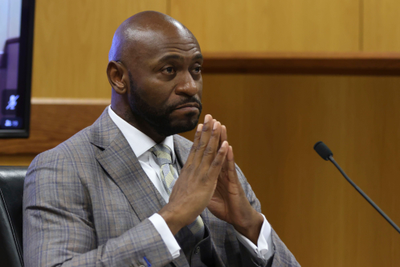
A court filing Friday uses cellphone location data to try to raise questions about the testimony given by a special prosecutor in the Georgia election interference case against former President Donald Trump who had a romantic relationship with Fulton County District Attorney Fani Willis.
The analysis of cellphone location data filed by Trump's attorneys shows prosecutor Nathan Wade had visited the neighborhood south of Atlanta where Willis lived at least 35 times during the first 11 months of 2021, an investigator said. Wade had testified that he had been to the condo where Willis lived fewer than 10 times before he was hired as special prosecutor in November 2021.
The new filing prompts fresh questions about the timeline of the relationship between Willis and Wade as Trump and other defendants, who are accused of illegally trying to overturn the 2020 election in Georgia, have argued that both prosecutors should be removed from the case because their romantic relationship created a conflict of interest.
In a response filed with the court late Friday, Willis' team said Trump's lawyers are trying to introduce inadmissible evidence and that even if the judge were to consider it, “the phone records simply do not prove anything relevant."
The investigator, Charles Mittelstadt, wrote that the data show that Wade visited the area in Hapeville where Willis lived at least 35 times during the first 11 months of 2021. Wade had testified during a hearing last week that he had visited the Hapeville condo where Willis was living fewer than 10 times before he was hired as special prosecutor on Nov. 1, 2021.
“So if phone records were to reflect that you were making phone calls from the same location as the condo before Nov. 1, 2021, and it was on multiple occasions, the phone records would be wrong?” Trump attorney Steve Sadow asked Wade during the hearing.
“If phone records reflected that, yes, sir,” Wade responded.
“They’d be wrong?” Sadow asked.
“They’d be wrong,” Wade responded.
Wade also testified last week that he had never spent the night at the condo where Willis was living, and Willis confirmed that. The investigator’s statement says that on two occasions — one in mid-September 2021 and one in late November 2021 — the data show that Wade’s phone appears to have arrived in the area where Willis lived late at night and remained there until early morning.
In their filing, Willis' team said the records “do nothing more than demonstrate that Special Prosecutor Wade's telephone was located somewhere within a densely populated multiple-mile radius where various residences, restaurants, bars, nightclubs, and other businesses are located.”
They do not prove the content of communications between Willis and Wade or that Wade was ever at any particular location, the filing says. They also don't prove that Wade and Willis were ever in the same place at any of the times listed, including during times when Willis was known to be elsewhere, it says.
A motion filed by Trump co-defendant Michael Roman alleges that Willis paid Wade large sums of money for his work and then benefited personally when he then used some of that money to pay for vacations. During a hearing last week, a former Willis friend and employee testified that she saw the two kissing and hugging before Wade's hiring.
Fulton County Superior Court Judge Scott McAfee held a two-day evidentiary hearing last week on motions by Roman and others to disqualify Willis and her office from the case. He has scheduled arguments on the matter for March 1.
Willis and Wade both testified during last week's hearing that they did not begin dating until early 2022, after Wade had already been hired as special prosecutor. They also both said that they shared travel expenses and that Willis reimbursed Wade in cash for money he spent on trips.
Mittelstadt wrote that he used a tool called CellHawk to analyze the data received from Wade's cellphone carrier. He said he focused on geolocation activity near the address of the condo where Willis had been living by creating a “very conservative geofence, which isolated the two cell towers in closest proximity to this address."
He said the geofence was used to conduct an assessment of whether Wade's phone had ever connected to those two towers and to eliminate any hits that could have happened during routine travel on nearby interstates. He wrote that the report included only occasions when the phone was connected for an extended period.
Mittelstadt's statement also says that the analysis revealed more than 2,000 voice calls and just under 12,000 interactions between Willis and Wade during the first 11 months of 2021, with “a prevalence of calls made in the evening hours."
Wade testified that they met during a judicial conference in October 2019 and spoke often beginning in 2020. Wade wrote in a sworn statement filed with the court that he served on Willis' transition team after she was elected district attorney in November 2020. In the spring of 2021, Willis asked him and two other attorneys to help her find a lawyer to lead the election investigation before ultimately tapping him for the job, he wrote.